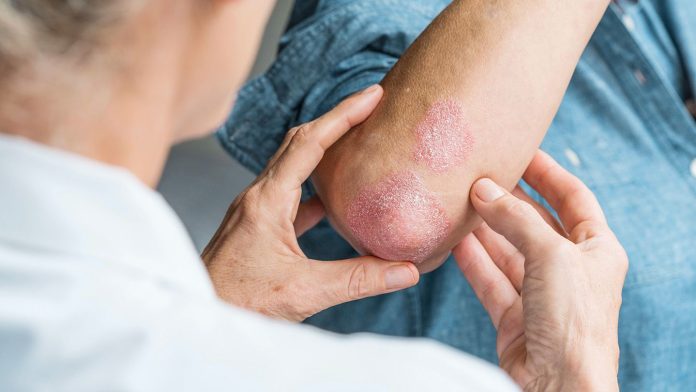Estimated reading time: 0 minutes
Psoriasis, more than just a skin condition, profoundly impacts an individual’s health both physically and psychologically. The characteristic skin lesions it produces are not only external markers but also reflections of the body’s internal health and immunological function. Gaining insights into the nature and implications of these lesions is crucial for effective management and enhancement of life quality for those affected.
Comprehensive Overview of Psoriasis
Psoriasis is commonly identified as an autoimmune condition, where the immune system mistakenly targets healthy skin cells. This misdirection causes an accelerated growth cycle of skin cells, resulting in thick, scaly patches known as plaques that are the hallmark of the disease. Psoriasis manifests in several forms, each with distinct features, affecting individuals to varying degrees.
Varieties of Psoriasis and Associated Lesions
Psoriasis presents in multiple types, each identifiable by unique skin lesions:
1. Plaque Psoriasis: This is the most prevalent form, presenting dry, elevated, reddish lesions covered with silvery scales. These plaques may cause discomfort or itching and can appear anywhere on the body.
2. Guttate Psoriasis: Characterized by small, droplet-shaped lesions covered with a fine scale, this type often starts in childhood or young adulthood. It may be triggered by a bacterial infection such as strep throat.
3. Inverse Psoriasis: Manifests as smooth, shiny lesions that are found in skin folds such as underarms, groin, or under breasts.
4. Pustular Psoriasis: Distinguished by white blisters of non-infectious pus surrounded by red skin, which may be localized or generalized.
5. Erythrodermic Psoriasis: The least common but most severe form, covering the entire body with a red, peeling rash that can itch or burn intensely.
Understanding the specific type of psoriasis and its lesions can aid in pinpointing triggers and refining treatment strategies.
Lesion Analysis: Insights They Provide
The lesions associated with psoriasis are more than superficial marks; they often indicate broader systemic issues, including potential joint problems, cardiovascular risks, and emotional health challenges.
Assessing Severity and Coverage
The extent and intensity of lesions can vary significantly among patients. Some might experience minor areas with plaques, while others deal with extensive and debilitating coverage. Monitoring changes in the lesions can serve as an effective gauge of treatment efficacy.
Identifying Triggers
Lesion outbreaks can be precipitated by various triggers, including emotional stress, physical skin trauma, certain medications, or even climate changes. Recognizing and understanding personal triggers is crucial for managing psoriasis effectively.
Evaluating Treatment Efficacy
The way lesions respond to treatment can provide critical feedback. Effective therapies usually result in reduced lesion size, decreased scaling, and diminished redness. Persistent or worsening lesions might necessitate a reevaluation of treatment approaches or a diagnosis.
To effectively manage psoriasis with a holistic approach, integrating Ayurvedic practices alongside conventional medical treatments offers a comprehensive strategy. Here’s how both Ayurveda and Western medicine can be combined to enhance the management of psoriasis:
Integrative Management Strategies for Psoriasis
Managing psoriasis requires a multifaceted approach that includes medical treatment, lifestyle adjustments, psychological support, and Ayurvedic remedies. By embracing both modern and traditional therapies, individuals can achieve better control over their symptoms and improve their overall health and quality of life.
Medical Interventions
1. Conventional Treatments: These may include topical agents such as corticosteroids and vitamin D analogues, phototherapy, and advanced options like systemic drugs or biologics, which target specific aspects of the immune system to control the disease process.
2. Ayurvedic Remedies: Ayurveda offers natural treatments involving herbal preparations and detoxification processes. Herbs such as turmeric, neem, and guggul are known for their anti-inflammatory and skin-healing properties. Panchakarma, a series of purification treatments, helps eliminate toxins from the body and reduce inflammation.
Lifestyle Adjustments
1. Dietary Modifications:
– Conventional Advice: Emphasizes a balanced diet rich in antioxidants and omega-3 fatty acids to reduce inflammation. Patients are often advised to avoid alcohol, smoking, and foods that trigger their symptoms.
– Ayurvedic Diet: Focuses on balancing the doshas, particularly Pitta, which is often associated with inflammatory conditions like psoriasis. Ayurvedic diets recommend cooling and purifying foods such as leafy greens and fruits, and avoiding hot, spicy, and oily foods.
2. Physical Activity: Regular exercise is beneficial in managing psoriasis symptoms and stress. Both Ayurveda and conventional medicine promote physical activity to improve circulation and overall health.
Psychological Care
1. Conventional Support: May include counseling and participation in support groups to help manage the psychological impact of living with a chronic skin condition.
2. Ayurvedic Practices: Techniques such as yoga and meditation are highly recommended to reduce stress and balance the mind and body. These practices help in managing stress and emotional well-being, which are crucial in controlling flare-ups of psoriasis.
Ayurvedic External Treatments
– Topical Applications: Ayurvedic practices often use pastes made from herbs like aloe vera, which soothes and moisturizes the skin, or a paste of sandalwood and rose water, which cools and calms inflamed skin.
– Oil Massages: Regular massages with Ayurvedic oils can hydrate the skin and reduce dryness and scaling. Oils like coconut oil or medicated oils such as Mahanarayan oil are used to soothe the skin and reduce inflammation.
Conclusion
The analysis of psoriasis lesions extends far beyond their physical appearance, offering insights into the systemic nature of the disease and its broader health implications. Understanding the significance of these lesions helps in crafting more personalized and effective treatment plans. By addressing both the symptoms on the skin and the underlying systemic issues, individuals with psoriasis can achieve better health outcomes and significantly improve their quality of life. This holistic approach not only aims to manage the skin manifestations but also supports the overall well-being of the patient, ensuring a comprehensive strategy for managing this complex autoimmune disorder.
Related-
Know More About Ayurveda Treatment For Psoriasis
GET IN TOUCH


Recent comments